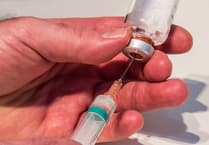Two local women have raised concerns about a threat to pets after five cats in Govilon are believed to have died after drinking antifreeze. Heidi Robinson and Nicola Thomas from The Avenue in Govilon have both lost pets in the last month and have been told that they are most likely to have died as a result of antifreeze poisoning On June 13, Ms Robinson's cat was rushed to Bridge Veterinary Group surgery in Brynmawr after she found him fitting and foaming at the mouth. When she got to the surgery, her cat was assessed and she was told that it ingested antifreeze. Despite treatment to try and counter the effects of the chemical it died the next day. Ten days later, her neighbour, Nicola Thomas noticed that one of her cats was showing similar signs and took it to the same veterinary surgery. Realising that no treatment was likely to work she made the heartbreaking decision to have her pet put to sleep. To add to her distress the same thing happened to another of her cats just three days later and then last week, the third of her cats showed the symptoms and despite early treatment he too did not survive the poison. Ms Thomas said, "I just couldn't believe it. When my first cat showed the same signs as Heidi's I was concerned, but for this to happen to all of my cats, even nine month old Runt, it was devastating." Later the pair became aware of another cat found by children that had also suffered the same fate. Due to the nature of the poisoning, unless the ingestion is caught immediately, it is very unlikely that an animal can be saved. And unfortunately this is becoming far too prevalent in the area. A representative of Bridge Veterinary Group surgery in Brynmawr said, "We have had an alarming number of reports like this from areas like Govilon and Blackwood, and while there is treatment which entails flushing fluids through the kidneys that can usually stop this, the treatment does not appear to be working in these cases. Whether this is due to a mix of chemicals within the anti-freeze we are unsure, but we urge all animal owners to keep an extra eye out for the welfare of their cats, and if they notice any signs to bring them in immediately." Ms Thomas took her concerns to the police, who said they have noted the incidents, and also informed the RSPCA. She said, 'We contacted the RSPCA to tell them, and they said we needed to make as many people aware of this as possible. "As we have no proof the cats were deliberately poisoned there can't be any prosecutions, but hopefully by doing this we can make more people aware that this is happening so they can keep an eye out for the signs." A spokesman for the RSPCA said, "We are deeply concerned about and extremely saddened by any spate of vehicle antifreeze poisonings of cats. Unfortunately the taste of antifreeze is very attractive to cats and ingesting just the smallest amounts can lead to kidney failure and death. "We would like to remind owners that unintentional poisonings can happen. Owners should take care and be vigilant when using antifreeze, making sure it is kept in clearly labelled, robust, sealed containers, away from pets and their environment. Antifreeze should always be disposed of safely and responsibly. "Signs of antifreeze poisoning can be seen anything from 30 minutes after a cat has ingested the chemical, though it can be two or three days before signs of kidney failure are seen. "The signs of antifreeze poisoning can include vomiting, seeming depressed or sleepy, appearing drunk and uncoordinated, seizures, difficulty breathing, increased thirst or increased urination. Poisoning a cat deliberately is a criminal offence, and under the Animal Welfare Act 2006, the maximum penalty for those found guilty of this offence is up to six months imprisonment and/or a fine of up to £20,000. Both woman are now appealing to the public to be more aware of the dangers and hope that by telling their story they can deter this happening again. Nicola said, "This has been very upsetting to watch my daughter have her heart broken everytime we have lost a cat. It is not nice to see your animal go through the pain of this poisoning or see them put down as they are part of your family. You would not treat a human this way, why do it to an animal. They feel pain the same as us humans." They also are appealing to the Welsh Government to see if there is a legal way of changing the taste of anti-freeze, to make it bitter rather than sweet to reduce the risk of cats ingesting it. Ms Thomas said, "This change has been made in America, and it is something we feel the Welsh Government should look into doing here to protect our animals." For more about the risks of anti-freeze to animals, and to help reduce the risk, visit rspca.org.uk.
Pet owners warned after cats poisoned in Govilon
Wednesday 9th July 2014 10:00 pm



